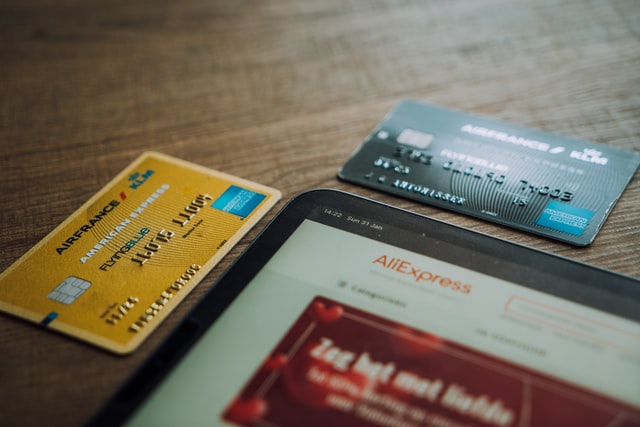Credit cards and debit cards free up space in your wallet. They simplify purchases and have many benefits. Consumers must choose between using their credit or debit cards for each transaction. We’ll discuss the pros and cons of each card if you’re deciding which one you should use for your expenses.
What is a Credit Card?
A credit card is a financial instrument that lets you pay for items by incurring debt. If you spend $20 on a credit card, you don’t lose any funds in your bank account. You will eventually have to deposit enough funds into your credit card to pay off the debt fully. Paying debt on time lets you evade interest payments, which can get expensive if unmonitored.
Credit cards have limits to prevent cardholders from going overboard on their purchases. Unfortunately, this limit also impacts your credit score. The credit utilization rate measures the percentage of your limit untouched. For example, if you have a $3,000 limit and accumulated $300 in credit card debt, you have a 10% credit utilization ratio. Many experts believe a credit utilization ratio under 30% is suitable for your credit score.
What is a Debit Card
A debit card also simplifies transactions. These cards draw from your checking account’s balance instead of a revolving line of credit. Each debit card includes a PIN. You need this number for some transactions, such as ATM withdrawals.
Debit cardholders must continue funding their checking accounts to use their cards. Exceeding your checking account funds with a single purchase will trigger an overdraft fee. Cardholders can also set up their cards to decline any purchase that exceeds their account’s funds.
Credit Cards vs. Debit Cards: Overview
Credit cards and debit cards each have many perks over cash. They’re easier to carry and give you more money to use. We’ll cover the advantages and disadvantages of both cards so you know which one to use for your purchases.
Advantages of Using A Credit Card
Most credit cardholders have access to more funds than debit cardholders. After demonstrating a good payment history, credit card holders can request credit limit extensions to tap into more funds. In addition to more funds, credit cardholders won’t have to worry about overdraft fees.
Credit cards also offer rewards for each purchase. Some credit cards provide cashback, while others give you travel miles. These perks add up and can help with expenses around the house. You also have less to worry about if someone steals your credit card. If they go on a spending spree, the funds don’t get pulled out of your checking account. You can report this fraudulent activity and be off the hook on the debt payment. You can still access funds in your checking account during the review.
Credit cards also offer purchase protection for the items you knowingly purchase. If the item arrived damaged or not as expected, you can request a refund. Some cards also offer extended warranties, which gives you extra time to request a refund. While credit cards offer rewards, high limits, and protection, the greatest advantage is their potential impact on your credit score.
Credit card companies report your payment history to the credit bureaus. Paying debts on time will increase your credit score. Your credit score is vital for many areas of your life. Lenders will look at your score before giving you a mortgage or auto loan. As a result, borrowers with higher credit scores get lower interest rates and higher loan amounts.
Lenders may let you borrow an extra $100,000 if your credit score is high enough. That additional $100,000 may be the difference between living in your desired location and settling for a home an hour away from where you want to live.
Advantages of Using A Debit Card
Debit cards help you stay in control of spending. Debit cardholders rely on the funds in their bank accounts instead of a revolving line of credit, leading to more intentional spending. Credit cardholders may binge without thinking about the consequences. Credit cardholders spend tomorrow’s money today. Debit cardholders don’t tap into future earnings with their purchases.
Debit cardholders also get to skip interest payments. Credit cards have notoriously high APRs that can plunge you deeper into debt and make the principal feel inaccessible. Some credit cardholders only have enough money to pay off the interest, which is not a viable long-term solution. Debit cardholders don’t have to worry about the consequences of high credit card debt.
Some vendors won’t accept credit cards or debit cards. When you encounter these vendors, it’s better to have a debit card. You can visit an ATM and withdraw funds from your bank account. After this withdrawal, you can visit the vendor and make the purchase. Credit cardholders can also get cash at the ATM, but it will cost a one-time fee and come with a high APR.
Disadvantages of Using A Credit Card
Credit cards give you access to more funds and rewards, but with great power comes great responsibility. Anyone who doesn’t pay credit card debt on time will incur interest at high APRs. These payments will make the principal debt harder to pay off. Some people stay in credit card debt for years and pay more than they have spent. Some cardholders mistakenly only make the minimum payment even though interest accumulates on unpaid debt.
Credit cards report your payment activity to credit bureaus. While this feature can increase your credit score, it can also ruin your credit if you fall behind on debt. A lower score may restrict access to mortgage and auto loans. You may not get approved or have to take out a loan with undesirable terms.
Disadvantages of Using A Debit Card
Debit cards often have less available funds than credit cards. If you’re a few dollars short, you can’t tap into a revolving line of credit. Debit cards are riskier if stolen. The thief will pull funds out of your bank accounts. If the thief also obtains your PIN, they can withdraw your account’s funds from an ATM.
You can send a report, but you still don’t have funds in your bank accounts as you wait. The sudden lack of funds will limit your ability to cover living expenses. Even after a report, you may be on a hook for the thief’s spending. You have to report fraudulent activity within two business days of learning about the theft to have the chance of getting your money back.
Traditional debit cards do not help with building your credit score. You can be a disciplined consumer but still not receive the loan you deserve. These debit cards don’t have any rewards programs, meaning no points or cashback. Some mobile banking apps overcome these setbacks.
Credit Cards vs. Debit Cards: Which Is Better?
The strength of the card depends on the individual. If you responsibly pay down debts and never spend more than you make, a credit card is better. You get to build credit, have extra protection, and earn rewards.
Consumers who want to spend less money and avoid debt should use debit cards instead. This card comes with fewer protections if it gets stolen, but the chances of it getting stolen are low if you keep it with you. Debit cards limit you to your current funds instead of letting you spend tomorrow’s money today.
Which Is Best for You?
Credit cards and debit cards both help consumers. They make purchases easier and come with several perks. Debit cards will make you more conscious of every purchase and can protect you from high APRs. It all boils down to your financial needs.







